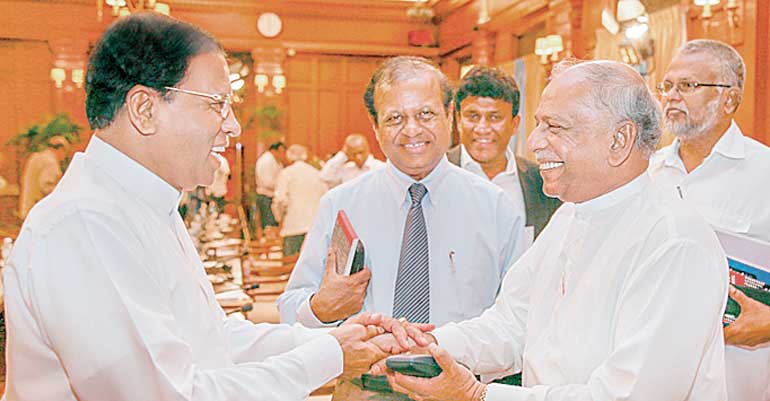Sunday Feb 22, 2026
Sunday Feb 22, 2026
Wednesday, 18 November 2015 02:04 - - {{hitsCtrl.values.hits}}

By Dharisha Bastians
President Maithripala Sirisena will present a special cabinet paper today, proposing wide ranging constitutional reform, including the abolition of the executive presidency and major changes to the country’s electoral laws.
President Sirisena, who swore upon the coffin of respected Buddhist Monk, Maduluwawe Sobitha last week that he would do everything in his power to abolish the presidency in accordance with the Thero’s wishes, said the cabinet paper will be presented to his Ministers at the weekly meeting today.
President Sirisena made the shock announcement while addressing a ceremony to present citizenship certificates to about 2000 new dual citizens of Sri Lanka at Temple Trees. Prime Minister Ranil Wickremesinghe and several other ministers were present at the ceremony.
“The special cabinet paper I will present tomorrow will propose the abolition of the executive presidential system and the transfer of executive power of the President in this country to Parliament and other institutions,” President Sirisena said.
President Sirisena said he would also present a cabinet paper at today’s meeting about electoral reform, with special emphasis on the abolition of the preferential voting system.
“This country needs an electoral system that will breed a political culture without bribery, corruption and irregularities and give the people a real choice in choosing their rulers and Government institutions.
Presidential powers were slashed once this year, with the enactment of the 19th Amendment in April, but critics, including the late Sobitha Thero said the constitutional amendment did not did not go far enough to curb the powers of the executive and substantially alter its character. The 19th Amendment rolled back the disastrous provisions of the 18th Amendment that removed the two term limit on the presidency and removed key state institutions from within the direct purview of presidential office. The amendment dubbed 19A, also re-established the independent commissions, slightly altered the degree of immunity enjoyed by an executive president and reduced presidential terms to five, instead of six years.
President Sirisena claimed victory in the 8 January presidential election by campaigning hard against the executive presidency, which he said allowed rulers like President Mahinda Rajapaksa to abuse power and take away the peoples’ freedom.